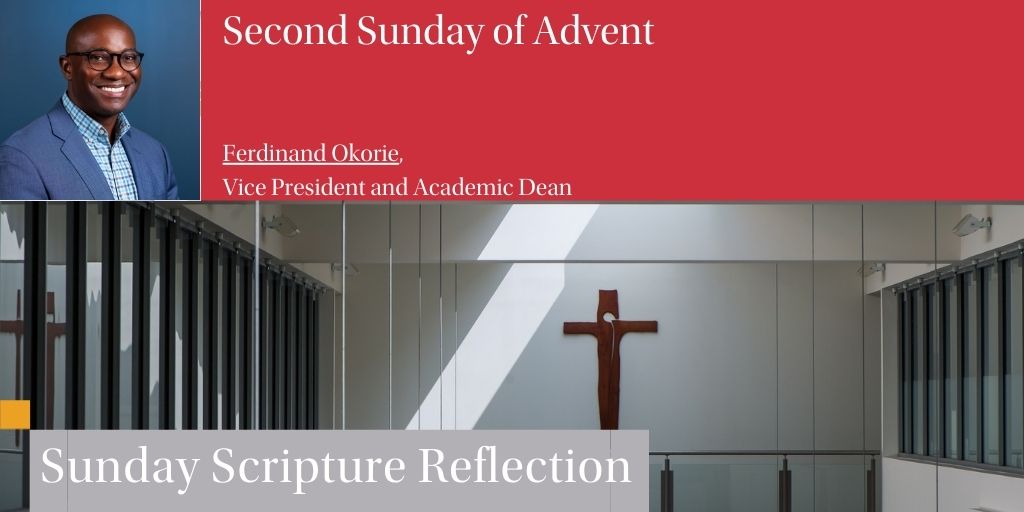
Readings:
Bar 5:1-9
Ps 126:1-2, 2-3, 4-5, 6.
Phil 1:4-6, 8-11
Lk 3:1-6
The commonly told Christmas story through images in my fourth-grade religious education class celebrates the power and greatness of God who became human in Jesus Christ to renew the world. In the First Reading today, God adorns Jerusalem with royalty, summoning the inhabitants of the city to garb themselves with the robes of nobility and royalty (Baruch 5:2). God invites them to dress up in royalty so that their splendor will shine forth in the world. The invitation to take off the robe of mourning and the rags of misery (v 1) and dress up instead in royalty elevates the humanity of the inhabitants of Jerusalem as God becomes the leader of a new beginning for the children of Israel (v 9). Their experience of security and justice will come from God’s glorious throne (v 4). With the period of mourning and misery over, God will bring back the inhabitants of Jerusalem, and on the strength of God’s words, the people and city will experience lasting renewal.
The prophecy of Baruch about what God is doing for the inhabitants of Jerusalem imbues them with the assurances of renewal and rehabilitation that their experiences of inhumanity, loss of lives, the destruction of properties and their city are not the entire story of their lives. The divine prophecy of restoration reveals the nature of God who hears the cry of his people and pledges to rescue them from their misery. God watches over the children of Israel, and God is ready to rebuild their lives from the experiences of indignity and inhumanity. The Psalmist invites them to burst forth in joyous celebration because God has come to rescue and restore their lives and their city (Pss 126: 1-2).
The royal imagery in the First Reading elevates the status of the inhabitants of Jerusalem over and above the imperial power and leadership of subjugation and oppression. The Gospel Reading continues to draw a contrast between the leadership and reign of God with that of human authority. By naming the chain of Roman leadership and authority other Palestine, the Evangelist draws his readers’ imagination into the challenging experiences of living under Roman rule. They endure heavy taxation (Mark 12:13-17), they suffer under Roman violent tactics against peaceful protest (Luke 13:1-12), and they are deeply affected by the sentiment of living under occupation in their own land. Let us remember that for fear of Rome’s attitude towards protest and insurrection, the High Priest Caiaphas supports the murder of Jesus to avoid Roman violent tactics against protest (see John 11:50). Therefore, Luke invites his readers to contemplate their current socio-political context and weak religious leadership in collusion with Rome so as to heed the message of John the Baptist, and then share in the renewal God promises.
In both the First and the Gospel Readings the church invites us to see beyond the futility of the present world order characterized by inhumanity, oppression, and the degradation of creation, and rather embrace the presence of God among us, Immanuel (Matt 1:23). In the First Reading, God is leading the path towards change of the present human conditions. In the Gospel, God’s presence invites us to share in that activity of renewal of the world; and John the Baptist responded with courage and boldness. John the Baptist embraced the ministry of Prophet Isaiah to proclaim the inauguration of the reign of God through Jesus Christ (Luke 3:4-5). The connection between the prophecy of Isaiah and the ministry of John the Baptist reveals God’s steadfast commitment to undertake the renewal of the world, to restore and mend those who are broken down by the dehumanizing systems of oppression. Both Isaiah, whose ministerial style John the Baptist embodies were bold, audacious and fervent in their belief in God’s promised leadership and renewal of the world.
Therefore, the church invites us on this Second Sunday of Advent to concretize in our lives the spirit that emboldened John the Baptist so as to embrace the new world order God has inaugurated through Jesus Christ. Every believer ought to embrace the koinonia (Phil 1:5) into which we have been called and share in the proclamation of the message of God’s leadership of the world. The politics of division and violence, the brokenness and bigotry of our social systems, and the inequality and greed of our economic practices demand courageous activity towards change and transformation for all. We ought to celebrate Advent and subsequently Christmas with the commitment to elevate, honor and promote the royal identity of all the children of God.
Ferdinand Okorie
Vice President and Academic Dean
Assistant Professor of New Testament Studies
